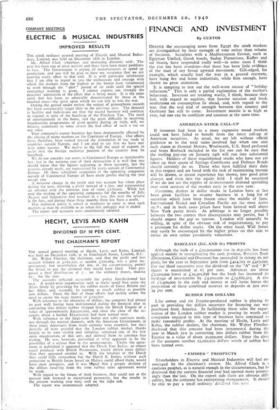HECHT, LEVIS AND KAHN
DIVIDEND OF 10 PER CENT.
THE CHAIRMAN'S REPORT
THE annual general meeting of Hecht, Levis and Kahn, Limited, was held on December 12th, at 19 Fenchurch Street, London, E.C. Mr. Walter Fletcher, the chairman, said that the profit and loss account balance at £195,551, as against D00,264, was a great im- provement, but nevertheless did not, in the circumstances, permit the board to pay the dividend they would have liked. They pro- posed a final distribution of 5 on the ordinary shares, making to''„ for the year. The accounts reflected accurately the policy foreshadowed last year. A world-wide organisation such as theirs could best assist the Allies firstly by providing for the rubber needs of Great Britain and her Allies, and, secondly, by turning as much rubber as possible into dollars. From the first of those efforts had mainly arisen the need to create the large reserve of £150,000.
With reference to the obtaining of dollars, the company had played its part well, having been instrumental during the financial year in converting into dollars rubber shipped from the British Empire of a value of approximately $30,000,000, and since the close of the ac- counts about a further $15,000,000 had been turned over.
With reference to the large-scale barter and sales contracts made, not through the normal channels, with the American Government, in these times departures from trade customs were essential, but inci- dentally all were grateful that the London rubber market, thanks largely to its own vitality and initiative, remained one of the few open organisations of this sort, and allowed them to continue free trading. He was, however, perturbed at what appeared to be the possibility of a serious flaw in the arrangements. Under the agree- ment as published it appeared that the Dutch East Indies, an almost equal producer with British Possessions, would obtain more dollars than they appeared entitled to. With the troubles of the Dutch they could fully sympathise but the Dutch E. Indies, without such protection as British forces based on Malaya could afford them, would have poor prospects, and it was Hetped that a proper division of the dollars resulting from the joint rubber sales agreement would be made.
With regard to the future of their business, they could not at the present look forward to exceptional prosperity, but the results in the present working year were well on the right side The report was unanimously adopted.


























 Previous page
Previous page